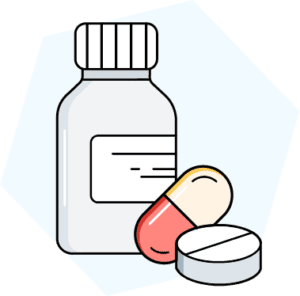Does Medicare Cover Substance Abuse Treatment?
Medicare covers substance abuse treatment in both inpatient and outpatient settings. Medicare Part A covers inpatient treatment, including services such as therapy and testing, and Part B covers outpatient treatment, which includes night programs to fit around your work schedule. Which part of Medicare covers your treatment — and how it is covered — depends on your specific circumstances.
Table of Contents
- Does Medicare Cover Substance Abuse Treatment?
- Understanding Substance Abuse Disorder
- Understanding Medicare Coverage for Substance Abuse Treatment
- How Does Medicare Advantage Cover Substance Abuse Treatment?
- How Much Does Substance Abuse Treatment Cost With Medicare?
- Alternate Ways to Cover Substance Abuse Treatment
- All in All
- Frequently Asked Questions
Understanding Substance Abuse Disorder
Substance abuse disorder is a complex condition where there is uncontrolled use of a substance despite harmful consequences. These substances can range from tobacco to alcohol or prescription drugs to illegal drugs.
In the United States, 46.3 million people aged 12 or older (or 16.5 percent of the population) met the applicable criteria for having a substance use disorder in the past year, according to the U.S. Department of Health and Human Services.
Addiction is a complex disease to handle alone, and individuals often need medical assistance to overcome their substance abuse disorder. Substance abuse treatment can include help with withdrawals, inpatient care, outpatient care, medication, and psychiatric care.
Understanding Medicare Coverage for Substance Abuse Treatment
If a patient has Medicare and needs substance abuse treatment, it is important to know what is covered and how. There are several different types of substance abuse treatments, usually categorized into inpatient treatment and outpatient treatment. Both options focus on rehabilitating the patient, but each has unique benefits.
Inpatient Treatment

Inpatient substance abuse treatment is treatment conducted in a setting such as an addiction treatment center, rehabilitation center, or hospital. There, the patient can receive medication to help assist in detox from the substance and ongoing care, such as counseling and treatment, to help overcome the addiction.
Inpatient treatments allows for a secluded space to focus solely on recovery. Patients will usually begin inpatient treatment with a detox period. After detoxing, they will follow a rigid daily schedule created by a team of doctors. Inpatient treatment can last any number of days but usually lasts 30 days to 6 months.
Eligibility
Patients must meet certain eligibility requirements for Medicare to cover inpatient treatment:
- A medical provider must state that the inpatient treatment is medically necessary.
- The treatment must be received at a Medicare-approved facility.
- The patient must also follow the medical provider’s plan for care.
Coverage
While at an inpatient treatment facility, certain treatments and procedures may be needed to help overcome addiction. The following services are covered under Medicare Part A:
- Medication to help wean or detox from the substance
- Education on addiction and substance abuse
- Psychotherapy
- Counseling and therapy
- Testing and assessments
- Post hospitalization follow-up
Outpatient Treatment

While inpatient treatment is conducted in a facility, outpatient allows patients to receive treatment without staying in a facility. Outpatient treatment is received from a clinic, hospital outpatient treatment program, or drug treatment program.
People suffering from mild to moderate substance abuse disorder may prefer an outpatient treatment program. These programs usually conduct classes and therapy at night or in the morning so patients can continue to go to work and live their lives. Well-known programs such as Narcotics Anonymous (NA) and Alcoholics Anonymous (AA) may be included as a part of outpatient treatment.
Outpatient treatment is often more affordable than inpatient treatment, making it a more attractive option for many people.
Eligibility
Outpatient treatment eligibility follows the same eligibility guidelines as inpatient treatment:
- A medical provider must state that the inpatient treatment is medically necessary.
- The treatment must be received at a Medicare-approved facility.
- The patient must also follow the medical provider’s plan for care.
Coverage
Medicare Part B will cover the following treatments for outpatient care:
- Medication to help wean or detox from the substance
- Education on addiction and substance abuse
- Psychotherapy
- Counseling and therapy
- Testing and assessments
Prescription Medication Treatment

Prescription medication treatment for substance abuse refers to using a prescribed medicine to overcome addiction. Popular medications used are buprenorphine, methadone, and naltrexone.
Original Medicare does not provide coverage for prescription medication outside of inpatient treatment. You would need to have a Medicare Part D plan to cover prescriptions. However, not all medications for substance abuse are covered under Part D.
Medigap Coverage
Medigap, also known as Medicare Supplement, is an optional plan that an individual can purchase to help cover anything that Medicare Parts A and B do not cover. Depending on the plan, Medigap may help cover the deductibles and copays not covered by Medicare. It is important to review your specific Medigap plan to see what is covered.
How Does Medicare Advantage Cover Substance Abuse Treatment?
A Medicare Advantage Plan is a plan that an individual age 65 or older can choose instead of Original Medicare. Medicare Advantage Plans must meet federal guidelines and offer the same coverage as Original Medicare. However, the copays, deductibles, and total out-of-pocket expenses with a Medicare Advantage plan may differ from Medicare.
In addition, most Medicare Advantage plans follow a network, meaning that the coverage must be obtained from certain providers for the plan to cover.
Unlike Original Medicare, a Medicare Advantage Plan usually includes prescription coverage and some additional coverages under one plan. An Advantage Plan may offer benefits that Original Medicare does not, which might be helpful when treating substance abuse treatment.
How Much Does Substance Abuse Treatment Cost With Medicare?
Inpatient care can vary from $14,000- $27,000 for a 30-day stay. Outpatient is often less costly but can still run thousands of dollars. Even though Medicare does cover substance abuse treatment, there are still some out-of-pocket costs to be familiar with.
Part A Costs
Medicare Part A covers inpatient treatment and has a $1,600 per stay deductible. The “per stay” refers to each hospital or facility admission. Coverage for inpatient treatment in a psychiatric facility is limited to 90 days per benefit period and 190 days in a lifetime. Inpatient stays in a general hospital are not subject to these limitations.
After the deductible is met for Part A inpatient treatment, some copays may apply.
Copay | |
|---|---|
First 60 days of coverage | $0 |
Days 61-90 | $400 per day |
Days 91-150 | $800 per day |
After day 150 | Medicare may not pay towards inpatient services. |
Part B Costs
While outpatient treatment can be more affordable, there can still be some costs. Medicare Part B has a $226 annual deductible. Once the deductible is met, there is a 20% <a class=”wpil_keyword_link” href=”https://assurance.com/health-insurance/copays-deductibles-and-coinsurance that applies. This means that Medicare will cover 80% of the treatment, and the insured will pay the remaining 20%.
Part D Costs
Part D costs depend on your specific plan. Part D plans have a yearly or monthly cost, deductibles, and copays. For example, one plan may have the following fees: a premium of $35 per month with a $250 deductible and a 20% copay.
Methadone, a common drug prescribed for opioid dependency, is not covered under Part D plans. However, there may be coverage for methadone if it is part of an in- or outpatient treatment. Review your specific plan with your provider to see what medications for substance abuse are covered.
Medicare Advantage Costs
If you have a Medicare Advantage Plan, the total cost for substance abuse treatment will vary depending on your specific policy. The annual deductible cap for any Advantage Plan is $8,300. The amount you may pay for substance abuse treatment cannot exceed that.
However, the overall cost will vary. Remember that Medicare Advantage Plans are also subject to networks, and certain providers may not be covered.
Alternate Ways to Cover Substance Abuse Treatment

If you do not have Medicare coverage, there are other ways to cover substance abuse treatment. The following alternatives may be ways to cover treatment:
- Private insurance: Many insurance plans provide coverage for substance abuse treatment. The extent of coverage will vary, so it’s best to review your plan.
- Medicaid: The ACA mandates that Medicaid cover substance abuse treatment, including inpatient and outpatient programs.
- Self-pay: Paying out of pocket for treatment can be expensive. However, some programs may offer discounts for patients self-funding their treatment.
- Non-profit organizations: Several non-profit organizations provide substance abuse treatment in some capacity. While these programs may be more limited, you can find support.
- State-funded programs: State-funded can be a more affordable option for many people struggling with addiction. You can visit the American Addiction Centers website to find a program near you.
Some facilities offer programs to assist with funding, such as sliding scales and payment plans. For assistance with finding resources, SAMHSA.gov lists a variety of resources.
All in All
If you have Medicare and need help with substance abuse, Medicare will provide coverage. You will have some out-of-pocket costs, but the overall expense will be much lower with Medicare. Medicare Part A covers inpatient treatment, Medicare Part B covers outpatient treatment, and Medicare Part D plans provide prescription coverage. If Medicare is not available to you, there are other options to explore, such as private insurance or non-profit programs.
